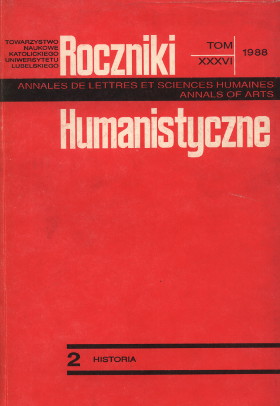The Clergy of Cracow Towards Kościuszko’s Uprising in 1794
Abstract
The author discusses the attitude of the Catholic clergy in Cracow towards Kościuszko’s insurrection in 1794. Cracow has been chosen due to its particular importance for the uprising; it was in Cracow that the uprising started was led by the Supreme Commander-in-chief. Tadeusz Kościuszko. Cracow was also the largest milieu of lay and religious clergy in Polish Republic.
The first chapter deals with the organizational structure and number of the clergy in Cracow on the eve of the insurrection. Due to a lack of an exact census of that time, the author takes advantage of rough estimates, on the basis of which he fixes the number of the clergy in Cracow in 1794 at about 800 (600 of the religious and 200 of lay clergy), which constituted ca 4 per cent of the town population.
In the second chapter the author analyzes the attitude of the leaders (Kościuszko, Kołłątaj, and I. Potocki) and of the local authorities of the insurrection in Cracow to the clergy. It comes from these analyses that the insurrection (and that already at its preparatory level) did not follow the French Revolution as far as its relation to the clergy and the Church is concerned. That is why all „Appeals” that had been addressed to the clergy since the first days of the insurrection were to be a warrant that the Polish revolution was not an attack on the Church or clergy. In order to fulfill this aim all insurrection festivities were richly religious in their form, and the Commander-in-chief attended them personally. The insurrection authorities promissed equal rights for the Catholic and Orthodox faithful alike, which was to complement the deed of the Great Sejm and encourage people of other denominations to take part in the uprising.
Cracow shows us that the authorities of the insurrection assumed that the Catholic clergy would meet very important propaganda tasks. Kościuszko expected that the clergy, as being educated citizens, would provide an example, by the sacrifice of their own estates and patriotic commitment to the uprising, and would personally encourage people from other classes, especially peasants to take an active part in it.
At the same time, the Catholic clergy, likewise the nobility had to provide money and services in kind on behalf of the uprising. Chapter III deals with this matter. The uprising authorities introduced a progressive tax, the so-called „general tax”, which tax was a thorough novelty. This tax increased in terms of the percentage along with the increase of incomes. The clergy were charged with more expenses than the nobility. Tables 4 and 5 show it. It comes from them that Cracow chapter had to pay the most, up to three fourths of its income, Cracow bishops had to pay a half of their income, and Cracow monasteries paid the least, ca 11 per cent.
Apart from that, the clergy, as being freeholders, along with the nobility, were charged with any other expenses in support of the uprising, ie providing recruits, raising troops by levy, limiting soccage. Additional to that were expenses on behalf of the city of Cracow which was threatened by the Prussian army. The confiscation of the Church valuables was a strain interpreted as an attack upon the Church and religion. The extent of this confiscation was presented in table 6.
The attitudes of the clergy (discussed in chapter IV) towards the uprising varied. There were, however, no radically negative attitudes in Cracow, nor radically revolutionary, the so-called Jacobinian, among the clergy. The majority of the clergy took an active part in all religious festivities connected with the uprising from the first days on. There were solemn services, ardent sermons and special precepts for the people in which the lower lay and religious clergy took the lead.
The clergy sat on the local uprising committee, e.g. The Organizing Committee of Cracow Province. A few Cracow canons supported the uprising from the very beginning through money and personal commitment. The rest of them acted with reserve, fulfilling commands of the uprising authorities, though. Paweł Feliks Turski, Cracow bishop, was not in Cracow during the uprising.
To sum it up, the author postulates carrying out further research in this direction, which research is based first of all on the Church and religious archives that have not been used so far.
Copyright (c) 1988 Roczniki Humanistyczne

This work is licensed under a Creative Commons Attribution-NonCommercial-NoDerivatives 4.0 International License.





